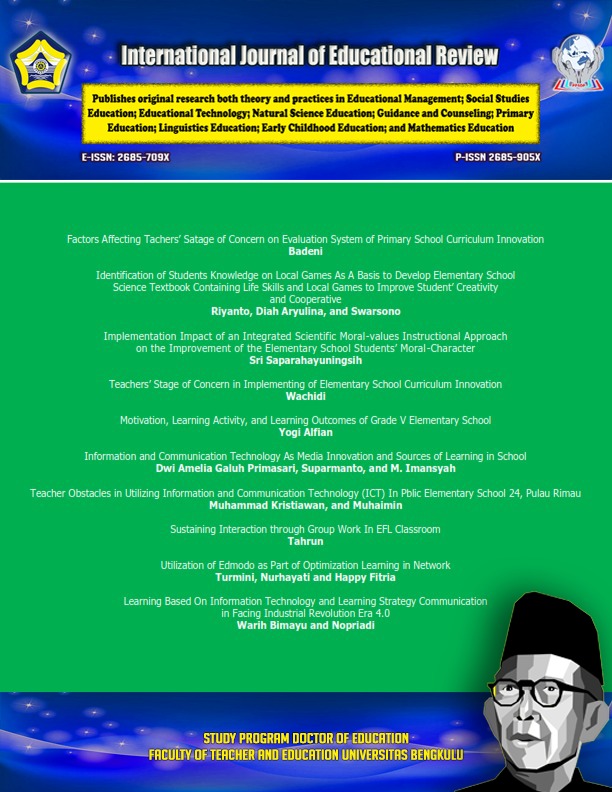Sustaining Interaction through Group Work In English Foreign Language Classroom
DOI:
https://doi.org/10.33369/ijer.v1i2.8847Keywords:
Sustaining, Interaction, Group WorkAbstract
The purpose of teaching and learning English as a foreign language in Indonesia is to enable the learners to use English for communication in various contexts. To promote communication in teaching and learning activities, the teachers should be able to initiate interaction. To initiate interaction, the teachers may use questions, by which the teachers should consider the appropriate types of question that match with the students. In addition, the teachers should be able to maintain or sustain the interaction in their teaching and learning context. One of the activities which are effective to sustain interaction in the process of teaching and learning is group work. By using group work, the learners are encouraged to interact in English communicatively. Besides, this method increases students' motivation in learning. This is as the effect of learning climate which offers freedom for the students to express their ideas, feeling or criticism freely in front of their group's members. In addition, group work promotes students' learning responsibility and autonomy. Each member of the groups must be responsible to achieve their common goal. Considering those ideas, group work can be one of the effective methods to sustain interaction in the EFL classroom.References
Bransford, J.D., Brown, A.L., and Cocking, R.R. (Eds.) (1999). How people learn: Brain, Mind, Experience, and School. Washington, D.C.: National Academy Press.
Brown, H. Douglas. (2001). Teaching by Principles: An Interactive Approach to Language Pedagogy. White Plaint: NY. Addison Wesley Longman, Inc.
Celce-Murcia, Marianne. (1991). Teaching English as a Second or Foreign Language, 2nd Edition. USA: Heinle& Publishers, a division of Wadsworth, Inc.
Crandall, Jo Ann. (1997). “Cooperative Language Learning and Affective Factors”. In Arnold, Jane (Ed.). (1997). Affective Factors in Language Learning. Cambridge: CUP.
Flowerdew, L. (1998). A Cultural Perspective on Groupwork. ELT Journal, 4.
Gebhard, Jerry Greer. (2000). Teaching English as a Foreign or Second Language: A Teacher Self Development and Methodology Guide. Michigan: The University of Michigan Press.
Gross Davis, B. (1993). Tools for Teaching. San Francisco: Jossey-Bass Publishers.
Gulo, W. (2002). Strategi Belajar Mengajar. Jakarta: PT. Grasindo.
Hall, Kelly Joan, and Verplaetse, Lorrie Stoops. (2014). Second and Foreign Language Learning through Classroom Interaction. New York, NY: Routledge.
Harmer, Jeremy. (2001). The Practice of English Language Teaching 3rd Ed: Completely Revised and Updated. Essex, England: Longman, Inc.
Johnson, D. W., Johnson, R. T., & Smith, K. A. (2014). Cooperative Learning: Improving University Instruction by Basing Practice on Validated Theory. Journal on Excellence in College Teaching, 25(3&4), 85-118.
Kuh, G.D., Kinzie, J., Buckley, J., Bridges, B., and Hayek, J.C. (2007). Piecing Together the Student Success Puzzle: Research, Propositions, and Recommendations (ASHE Higher Education Report, No. 32). San Francisco, CA: Jossey-Bass.
Long, Michel H. and Porter, Patricia. (1985). Group Work, Interlanguage Talk, and Second Language Acquisition. TESOL Quarterly 19:207-28.
Richard-Amato and Patricia A. (1998). Making It Happen: Interaction in the Second Language Classroom, From Theory to Practice. New York, NY. Longman Inc.
Roberson, B., & Franchini, B. (2014). Effective task design for the TBL classroom. Journal on Excellence in College Teaching, 25(3&4), 275-302.
Saleh, Yuslizal. (1997). Methodologies of TEFL in Indonesian Contexts. Palembang: Teacher Training and Education of Swiwijaya University.
Springer, L., Stanne, M. E., & Donovan, S. S. (1999). “Effects of Small-Group Learning on Undergraduates in Science, Mathematics, Engineering, and Technology: A meta-analysis”. Review of Educational Research, 96(1), 21-51.
Springer, L., Stanne, M. E., & Donovan, S. S. (2018). Twenty Questions. Retrieved May 15, 2018.
Downloads
Published
How to Cite
Issue
Section
License

This work is licensed under a Creative Commons Attribution-ShareAlike 4.0 International License.



